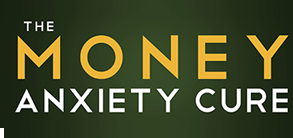I just got back from two amazing weeks in Cuba, and it felt like I entered a country frozen in 1959. Everything is still as it was at the time of the revolution; large, rusty Pontiacs and Buicks, Cadillacs and Studebakers, crumbling yet elegant plaster buildings, and appliances with all metal parts (imagine!).
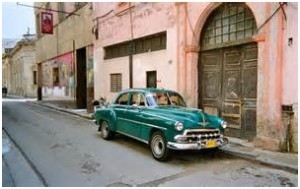 Yet while the objects have been frozen in time, the people make up for it; their bodies moving to a soundtrack of Latin and African music, seeming to come from every open window. It is the rich fuel for the soul of the people and country. Young and old fill the streets, the markets, and the discos of Cuba from sunrise to well past what we Americans think of as “bed time.” Art covers every wall and the colors are hot and bold, just like the people – African, Spanish, Central American, French, and Portuguese.
Yet while the objects have been frozen in time, the people make up for it; their bodies moving to a soundtrack of Latin and African music, seeming to come from every open window. It is the rich fuel for the soul of the people and country. Young and old fill the streets, the markets, and the discos of Cuba from sunrise to well past what we Americans think of as “bed time.” Art covers every wall and the colors are hot and bold, just like the people – African, Spanish, Central American, French, and Portuguese.
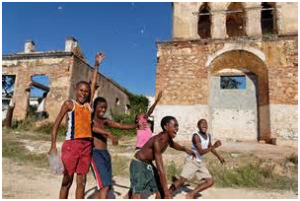 I arrived just days after Obama and Raul Castro announced the start of talks between the U.S and Cuba to open up diplomatic relations. Understandably, the Cubans, while light-hearted, after 50 years of closed borders with the US, expressed cautious optimism in the progress of any speedy changes.
I arrived just days after Obama and Raul Castro announced the start of talks between the U.S and Cuba to open up diplomatic relations. Understandably, the Cubans, while light-hearted, after 50 years of closed borders with the US, expressed cautious optimism in the progress of any speedy changes.
Over a bottle of soda or a bottle of rum, they freely shared their dreams of freedom, earning a decent living, traveling to visit family in other countries, and the possibility of income from tourism, and of investors that could get the country back on it’s feet, economically.
I saw, heard and felt no stress from the folks I met, despite the obvious economic challenges. Imagine how life would be here if we had to wait in line for 20 minutes to get a loaf of bread, or an hour to enter a bank. Most know no other way. They wait in long lines for their meager rations of rice, eggs, bread, and alcohol. They don’t seems to mind the long lines to enter a bank, or to get phone service, and shockingly, they accept the fact that what they are being offered in the supermarkets; a few bottles of soda, a freezer with one or two ice cream bars, maybe a few bars of soap on the shelves, and that’s it. As a Westerner, I was stretched to my limit in terms of just being able to feed myself and it was an opportunity to go on a forced diet, with no snacks to be purchased anywhere, and restaurant meals that were comprised of mostly chicken, pork, rice and beans. Really “involuntary simplicity.”
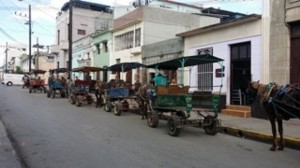
And of course, there is a silver lining to all this; the Cuban people are, for the most part, physically fit and remarkably happy. With transportation almost non-existent and great year-round weather, they walk everywhere. They don’t have the constant worry of keeping up with their neighbors, of getting ahead financially, of taking expensive vacations or buying luxury items. Plastic surgery and what we have come to expect as normal “maintenance” are not a topic of conversation, and the children don’t pester their parents for Smartphones and other gadgets.
 Instead of the rat race we assume is “normal” Cubans pass the day with music and community, dancing whenever and wherever they can. Even while they wait in line for the teller at the bank, the music is blasting, customers are dancing, smiling, singing and socializing to pass the time. I loved it so much, I barely cared whether I got my money or not.
Instead of the rat race we assume is “normal” Cubans pass the day with music and community, dancing whenever and wherever they can. Even while they wait in line for the teller at the bank, the music is blasting, customers are dancing, smiling, singing and socializing to pass the time. I loved it so much, I barely cared whether I got my money or not.
As an Iranian American living in San Francisco, I admit that I’m attached to my privileged lifestyle. I’ve worked hard to afford those things that I now feel attached to having, when and where I want them. But after a few days with these happy people, I began slowing my pace, living more simply, opening my heart and replacing luxuries for experiences. Totally cut off from my family and friends, and (surprise!) no access to my money, I had no choice than to submerge myself into the Cuban lifestyle. And they opened their hearts to me with a sweet, gracious and kind presence.
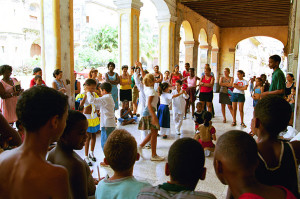 There is an acceptance in the manner of “we are all in this together, regardless of where you come from. Join us for some Salsa and rum.”
There is an acceptance in the manner of “we are all in this together, regardless of where you come from. Join us for some Salsa and rum.”
One amazing thing I noticed which we lack in the west is how the Cubans reach out to who ever they need to for support. A taxi driver just stops and asks a crowd of folks a question, and the entire crowd enthusiastically offers what ever help he/she can. Imagine if we can do this in our cities?
The other thing I noticed is they are all interconnected. Everyone knows empathetically what his neighbor (or a stranger!) needs and offers whatever support that comes through their network; and this benefited me greatly as often a casa was full, or I couldn’t find transportation, and one of my new friends would simply pick up the phone and the problem was resolved. I felt held in a way that I’ve not experienced in my own country. We have much to learn from the Cubans. I look forward to my future trips and keeping long friendships with my new friends!
